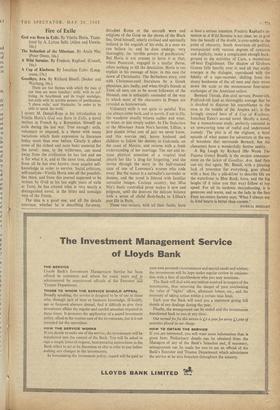Fire of Exile
Goodbye, Ava. By Richard Bissell. (Seeker and Warburg, 16s.) There are few themes with which the men of our time are more familiar: exile, with its suf- fering, its heartbreak and its tragic nostalgia; but exile with its terrible powers of purification. 'I chose exile,' said Nietzsche, 'in order to be able to speak the truth.'
I QUOTE M. Daniel-Rops in his introduction to Vintila Horia's God was Born in Exile, a novel written in French by a Rumanian, himself an exile during the last war. True enough : exile, voluntary or imposed, is a theme with many variations which finds expression in literature today more than ever before. Clearly it offers some of the richest and most basic material for the novel: man, in the wilderness, can stand away from the civilisation he has lost and see it for what it is, and at the same time, alienated from all he has ever known, must acquire self- knowledge in order to survive. Social criticism, self-analysis—Vintila Horia sees all the possibili- ties there, and from this journal supposed to be written by Ovid in his last eight years of exile at Tomi, he has created what is very nearly a distinguished novel, in the bitter and nostalgic vein of the Trivia.
The idea is a good one, and all the details convince, whether he is describing far-away, decadent Rome or the uncouth wars and religions of the Gets on the shores of the Black Sea. Ovid himself, utterly civilised and spiritually isolated in the anguish of his exile, is a man we can believe in; and he does undergo, very thoroughly, the 'terrible powers of purification.' But Horia is not content to leave it at that; where Pasternak, engaged in a similar theme, offers nothing to fill the desolation, Horia is too explicit in his message of hope. in this case the dawn of Christianity. The Bethlehem story, told with Christmas-card literalness by a Greek physician, jars badly, and when Ovid's friends at Tomi all turn out to be secret followers of the Messiah, one is unhappily reminded of the way in which most of the characters in Proust are revealed as homosexuals.
Voluntary exile is not quite so painful. You can always come back, and in novels, if not in life, the wanderer usually returns sadder and wiser, or wiser, or just simply sadder. In The Seduction of the Minotaur Anais Nin's heroine, Lillian, a jazz pianist (what sort of jazz we never know, and this worries me), leaves husband and children to follow her destiny in Golconda, on the coast of Mexico, and returns with a fresh understanding of her marriage. The sun and in- . tense physical sensation of a tropical land absorb her like 'a drug for forgetting,' and she moves through the story in the half-tranced state of one of Lawrence's women who rode away. But the trance is a surrealist's surrender to dreams, and the novel is littered with familiar surrealist images. Cocteau country, but Miss. Nin's finely controlled prose makes it new and poignant, until she destroys the delicate balance with a series of clichd flash-backs to Lillian's past life in Paris.
These two writers, with all their faults, have
at least a serious intention. Frederic Raphael's in- tention in A Wild Surmise is not clear, or, to give him the benefit of the doubt, is over-subtle to the point of obscurity. South American oil politics, manipulated with various degrees of cynicism and duplicity, make a complicated enough back- ground to the activities of Carn, a mysterious off-beat Englishman. The shadow of Graham Greene falls heavily over it, and all that really emerges is the dialogue, reproduced with the fidelity of a tape-recorder, shifting from the sleazy bonhomie of the oil men and their wives down the scale to the monotonous four-letter exchanges of the American sailors.
Bernard Thrush, dim civil servant, Pooter-ish, Prufrock-ish (and so thoroughly average that he is shocked to discover his resemblance to the man in the middle of the Amplex ad.), is the lovingly created hero of A Cup of Kindness, Jonathan Eales's second novel. Hardly a novel, but a monochrome study, perfectly executed in an unwavering tone of rueful and understated comedy. The plot is of the slightest, a brief episode of what passes for adventure in the sea of boredom that surrounds Bernard, but thk.. characters have a wonderfully furtive reality.
A Big Laugh by Richard (He Wrote The Pajama Game) Bissell, is the modest announce- ment on the jacket of Goodbye, Ava. And they can say that again. Mr. Bissell, with a pleasing lack of reverence for everything, goes ahead with a beat like a pile-driver to describe life on the waterfront in Blue Rock, Iowa, and the big laughs (if it takes you that way) follow at top speed. For all its sardonic sharpshooting, it is generous and warm, and as the lady in the Sno Fuzz ice-cream factory says, 'What I always say is, kind hearts is better than cornets.'
PATRICIA HODGART














































 Previous page
Previous page